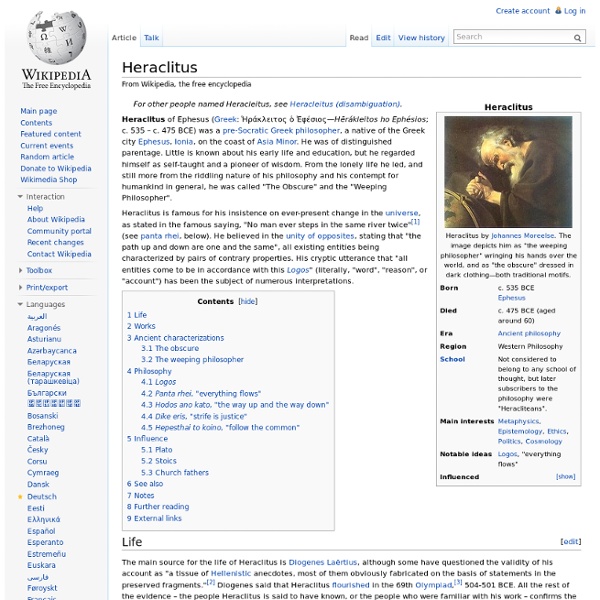Stoicism
Philosophical system Stoicism is a school of Hellenistic philosophy founded by Zeno of Citium in Athens in the early 3rd century BCE. It is a philosophy of personal virtue ethics informed by its system of logic and its views on the natural world, asserting that the practice of virtue is both necessary and sufficient to achieve eudaimonia (happiness, lit. Stoicism flourished throughout the Roman and Greek world until the 3rd century CE, and among its adherents was Emperor Marcus Aurelius. History[edit] The name Stoicism derives from the Stoa Poikile (Ancient Greek: ἡ ποικίλη στοά), or "painted porch", a colonnade decorated with mythic and historical battle scenes on the north side of the Agora in Athens where Zeno of Citium and his followers gathered to discuss their ideas, near the end of the 4th century BCE.[4] Unlike the Epicureans, Zeno chose to teach his philosophy in a public space. Scholars[who?] Philosophical system[edit] Logic[edit] Categories[edit] Epistemology[edit] Physics[edit]
Stoicism
Stoicism Stoicism initially emerged as a reaction against philosophical Hedonism which supports the pursuit of pleasure and the avoidance of pain. For a strict Hedonist, nothing that provides pleasure can be bad. The happy life contains the most possible pleasure, and the least possible pain. One primary difference between philosophical Hedonism and the instinctive pursuit of immediate pleasure is the notion that although most people think they know what they need to be happy, a cursory look around shows that most of us don't. Aristippus was the archetype of strict Hedonism - the meaning of life is pleasure. Aristippus held that the pleasure of the moment is better because the future may never come, or things may be different in the future. Epicureanism was a refinement of strict Hedonism. Cynicism was a revolt against the rigidly ordered philosophies of Plato and Aristotle, but it admired Socrates. Stoics accepted the Cynic premise that excessive wanting always leads to unhappiness.
On Taoism
Sit back and listen to Ken Cohen's talk on Taoist philosophy. Technical RequirementsThis audioclip requires RealPlayer. : Let's begin now to discuss Taoist philosophy. But here's the paradox: In spite of this philosophy, Lao Tzu did speak. Tao means "path"--that's the literal meaning of the Chinese character--more specifically, a path that we blaze through the wilderness beyond knowledge. The word "Tao" has a similar range of meanings to the Greek word "logos." The Tao is also the way of nature. The Tao is a transcendent state of being--beyond the reality of the mind that includes words, and beyond the reality of the senses. The philosophy of Taoism is summarized and distilled in the opening of Lao Tzu's classic the "Tao Te Ching." Perhaps the most important reason why we cannot know the Tao is because it is not a matter of knowledge but of experience.
Western Philosophy
Wu Wei and “moving with the flow” | Pennsylvania Echoes
There are a couple distinctions in Taoist philosophy,: The Subjective: The way people interpret and describe the way things happen. The Tao: the way things, or Nature, truly happen, which transcends human description. A person’s reaction to “the way things happen” is influenced on how he/she internalizes the way things happen. great discrepancy between: the way nature happens(or Tao), and how a person internalizes the way things happens, …can lead to stresses, and chaos. According to Taoism , no person can fully know the Tao, The universe, nature’s forces and ways of change… because the Tao transcend human senses, full rational dissection, and full description. However. That is: Move , work with, or flow with Nature, Act in Harmony with Tao and one will experience less stress and chaos and one will experience more happiness. Wu Wei Wu Wei is the principle of “No Action”. If person canoing upon a river is paddling against, or across the current, he must exert a lot of energy. Like this:
Taoism - The Wu-Wei Principle - Part 4
This unceasing flow of change manifests itself as a natural order governed by unalterable, yet perceivable laws. Paradoxically, it is the constancy of these governing principles (like the rising and setting of the sun and moon and the changing of the seasons) that allows people to recognize and utilize them in their own process of transformation. Gaining an awareness of life's essential unity and learning to cooperate with its natural flow and order enables people to attain a state of being that is both fully free and independent and at the same time fully connected to the life flow of the Universe - being at one with the Tao. From the Taoist viewpoint this represents the ultimate stage of human existence. The writings of the legendary Taoist sages, Lao Tzu and Chuang Tzu, furnish us with specific principles as a guide to attaining this state of oneness. These sage's beliefs are becoming increasingly popular outside of the Asian culture.



